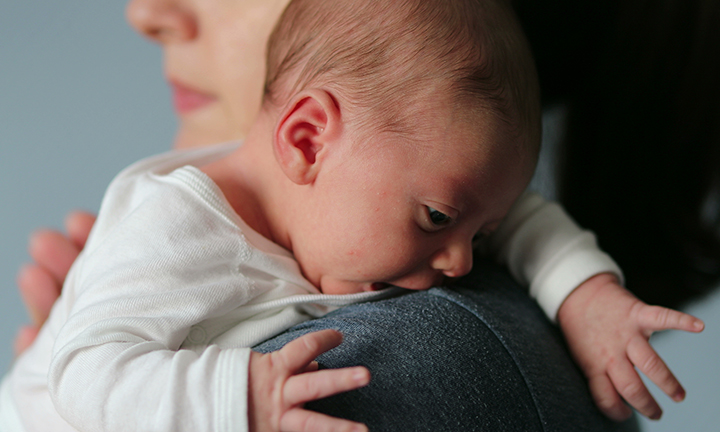
Helping Your Baby with Constipation


How to Help a Constipated Baby: Understanding the Causes and Solutions
Constipation can be uncomfortable for babies and concerning for parents, but it’s usually temporary and can often be eased at home. Signs include fewer bowel movements than usual, hard stools, and straining during pooping. Common causes include:
Gentle remedies—like offering water or fruit juice, adjusting your baby’s diet, or trying a warm bath—may help provide relief. In this article, we’ll explore the causes of baby constipation, simple ways to manage it, and when to seek medical advice.
What Is Constipation in Babies?
To understand baby constipation, it’s important to know what stools are like for infants. Although every baby is different, and there’s a broad range of what’s normal when it comes to pooping, many babies will poop after each feeding in the first weeks of life.
Then, after about 3 to 6 weeks of age, some breastfed babies will poop less often, even as little as once a week. That's because breast milk creates almost no solid waste that has to be eliminated from the digestive system. Formula-fed babies tend to poop once a day or once every other day.
In terms of consistency, your baby’s stools should be soft when everything is normal.
Your baby may be constipated if they produce hard, dry bowel movements, which may be difficult or even painful to pass. And, if your baby’s constipated, their bowel movements may be more infrequent than what’s normal for them.
What Are the Signs and Symptoms of Infant Constipation?
If you’re trying to figure out how to tell if your baby is constipated, the following signs may indicate your little one is constipated:
What Causes Your Baby's Constipation?
Constipation is uncommon in young babies, especially if they aren’t eating solid foods yet. What causes constipation in newborns may vary, but it usually has to do with changes in diet as they grow. For instance, constipation in infants might appear once they start solids, as their digestive system adjusts to new types of food.
Sometimes, it’s simply part of their unique bowel pattern. However, if you’re wondering why your baby is constipated, factors like a recent dietary change or even formula type might play a role.
In very rare cases, your baby’s constipation may be caused by an underlying condition, such as Hirschsprung's disease, hypothyroidism, or cystic fibrosis. Contact their healthcare provider if you think your baby has constipation due to any of these conditions, or if you have any questions about your baby's symptoms.
Teething and Constipation
When your baby is teething, you might wonder if there's a link between teething and constipation. While teething itself doesn't directly cause constipation, some babies may eat less due to gum discomfort. Ensuring your little one stays hydrated and offering soothing teething remedies may help maintain regularity.
Formula Feeding and Constipation
If you're formula feeding, you might question, "Will formula cause constipation?" Some babies may experience constipation with formula milk, as certain formulas may be harder to digest. If your baby seems uncomfortable, consider discussing with your healthcare provider about trying a different formula. They may recommend the best infant formula for constipation to suit your baby's needs.
Breastfeeding and Constipation
For those breastfeeding, constipation is less common since breast milk is easily digested. However, if you're concerned about why your breastfed baby is constipated, observe their feeding patterns and consult your healthcare provider. They may offer guidance tailored to your little one’s situation.
Remember, each baby is unique. If you have concerns about your baby's bowel movements, it's always best to consult with your healthcare provider for personalized advice.
Download Your Go-To Breast-feeding Guide for more information!
How Long Can Your Baby Go Without Pooping?
The frequency of your baby’s bowel movements may vary from day to day, and every baby is different. A baby consuming formula tends to poop at least once per day, but it’s possible for an infant not to poop for a day or two without necessarily being constipated.
In the early weeks, breastfed babies may poop more often since breast milk is easily digested, but at around 3 to 6 weeks old, breastfed babies may start having fewer bowel movements, with as little as one or two per week, but still not be constipated.
How to Relieve Your Baby's Constipation
If your baby is dealing with constipation, there are gentle, effective ways to help them feel more comfortable. Some simple at-home techniques may provide relief, while other options may require guidance from your baby’s healthcare provider.
Let’s explore these approaches, from home remedies to more specialized options, so you can find the best fit for your baby’s needs.
Home remedies
Once your baby has started on solid foods, there are some simple constipation remedies you can try to help get things moving. It’s always best to consult your healthcare provider, who may recommend introducing the following adjustments:
Suppositories
If dietary adjustments haven't eased your baby's constipation, your healthcare provider might suggest using baby suppositories. These are small, solid medications inserted into your baby's rectum to help stimulate a bowel movement. Glycerin suppositories work by drawing water into the intestines, softening the stool, and typically producing a bowel movement within 15 to 60 minutes.
It's important to use these baby suppositories only occasionally and under medical supervision, as overuse can lead to dependency or irritation. Always follow your healthcare provider's instructions regarding dosage and frequency to ensure safe and effective relief for your baby's constipation.
Laxatives & Enema
Before administering laxatives, mineral oil, or enemas to your baby for constipation, consult their healthcare provider to ensure safety and appropriateness.
Positions to Help Your Baby Poop
Certain gentle positions to help your baby poop may help encourage their bowel movements and relieve discomfort. Here are a few you can try:
When Should You Contact Your Baby’s Healthcare Provider?
It’s natural to ask, “When should I worry about my baby’s constipation?” While occasional constipation is common, there are certain signs that may indicate it's time to reach out for medical advice.
FAQS AT A GLANCE
Avoid using over-the-counter laxatives or enemas without consulting your baby's healthcare provider. Stick to gentle methods, such as tummy massages or dietary adjustments, to relieve constipation naturally. Always consult a provider before trying any new remedy.
The Bottom Line
Constipation is more likely to happen after your baby starts eating solid foods for the first time, typically around 6 months of age. As their digestive system adjusts to these new foods, occasional constipation may occur.
Otherwise, constipation in babies is fairly uncommon, so if your baby hasn’t had a bowel movement in a few days, they may not be constipated. Watching for symptoms like pellet-like poop may help determine if constipation is an issue.
Although constipation may make your baby uncomfortable, especially when straining to poop, simple remedies often provide relief. Adjustments in their diet, like introducing fiber-rich foods or offering small amounts of water, may ease constipation. If these changes don’t work, contact your baby’s healthcare provider, who may suggest trying a suppository or another gentle treatment.
To make diapering and everyday essentials easier on your budget, check out the free Pampers Rewards app. The app offers exclusive discounts and digital offers that can support you in providing the best care for your little one.
- American Academy of Pediatrics. Caring for Your Baby and Young Child: Birth to Age 5, 7th ed. (New York: Bantam Books, 2009.)
- Cleveland Clinic. "Constipation in Children."
- Healthy Children. "Abdominal Pains in Infants."
- Healthy Children. "Infant Constipation."
- KidsHealth. "How Can I Tell if My Baby Is Constipated?"
- La Leche League International. "Constipation."
- Mayo Clinic: What are the signs of infant constipation? And what's the best way to treat it?
- MedlinePlus. "Constipation in Infants and Children."
Read more about Baby
Join a World of Support
through Pregnancy and Parenthood.
TRACK WITH TOOLS
LEARN WITH EXPERTS
GET REWARDED















